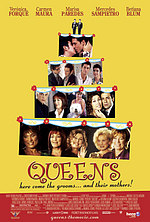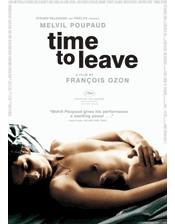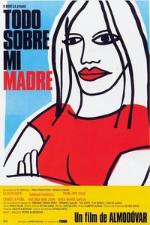
Knight at the Movies ARCHIVES
Almodóvar's masterpiece, Amodóvar Lite, and another contemplative film essay from Ozon
It’s all about gay themed foreign films this week. Oh sure, I know you won’t be able to stop yourself from taking in the four young
hottie warlocks of The Covenant, the homoerotic male version of The Craft. But after you’ve indulged your guilty pleasure, leave room
for something a bit more substantial.
First, a reminder that the Pedro Almodóvar fest continues at the Music Box in Chicago this Friday with a special one week screening
of his masterpiece, the dramatic, compelling and gay infused All About My Mother. After her gay son’s tragic death, his mother
(Cecilia Roth) sets out to find the young man’s father and encounters a salty transvestite, a pregnant nun and the actress that the
young man adored. Chock full of references to All About Eve, and A Streetcar Named Desire and indirectly to the movies of Douglas
Sirk, as usual, Almodóvar bends genres and preconceptions left and right as the story progresses. This is a rare chance to see this
transcendent and moving experience (not to mention its lush cinematography) on the big screen via a freshly minted 35mm print.
Just blocks away at the Landmark Century Centre Cinema are two other gay themed foreign films that also offer a refreshing change
from the usual end of the summer movie gunk. After the heavy duty All About My Mother, the perfect cinematic palette cleanser is
the Spanish comedy, Queens. The film features several of the Spanish cinemas most notable actresses, including several who
have worked closely with Almodóvar (including both Marisa Paredes from All About My Mother and his great muse, Carmen Maura).
Directed and co-written by Manuel Gómez Perira, the movie centers on five gay couples about to be legally married in a mass
wedding ceremony – a first for Spain. The couples are a disparate group of 30-something cuties with a physical range from a bottle
blonde fashion queen to a cuddly bear cub (an actor with not a hint of rhythm, however, who is given the unfortunate task of
performing a musical number). As the picture opens the couples have a lot more to worry about than making history when their
overbearing mothers arrive for the festivities.
The mothers are distinguished by their proclivities – one is a sex crazed fanatic; another a snobbish movie star who has a yen for
her son’s male fiancée – her own gardener. Then there’s the conservative mother – a judge – who has the ironic task of performing
the mass ceremony against her wishes and finally there’s the nightmare mother – the one who arrives from faraway Argentina
complete with a carpet soiling sheep dog and announces she’s moving in with her son and impending husband for three months.
Naturally, complications galore ensue and from the raves the picture’s getting, you might think this is the funniest comedy of the
year. While it’s far from that, Queens is amiable enough and will suffice until Almodovar’s own long overdue comedy, Volver, arrives
this fall. The soundbite for Queens: Almodóvar Lite.
Also playing this week – and only this week – is Time to Leave, the latest from gay writer-director, François Ozon. The set up is
thus: 29 year-old Romain (Melvil Poupaud), a gay French photographer whose career seems to mirror that of David LaChapelle
learns that he has an inoperable, cancerous brain tumor and will die within a few short months. From the moment the prickly
Romain finds out about his diagnosis (which he refuses to disclose to anyone) he begins both an inner and outer journey to accept
the inevitable.
In typical Ozon fashion, delicious ambiguities abound and we alternately sympathize and recoil from the physically beautiful yet
selfish Romain who is horribly cruel to his sister and indifferent to other family members (“I’m not a nice person” he tells a pretty
waitress at one point and he’s telling the truth). As expected, Ozon doesn’t hesitate to push the envelope. In one scene (that
features full frontal hardcore male nudity) Romain makes passionate love to his boyfriend one moment and then tries to choke him
the next.
Throughout his journey, at various points, Romain returns, in Narcissus like fashion, to look at himself in the mirror. “I want to tell
you I love you and I’m very ill and I’m going to die” he says to his image at one point before doing a line of coke. In another visit
to the looking glass, the face of the adolescent, innocent Romain stares back at him. This haunting image is repeated several
times as the film deepens. A telling episode occurs when Romain – who has the air of a man who has relied on loneliness as a
shield as surely as his beauty has given him an edge -- visits his free thinking grandmother and finally lets some of his inner grief
out (with Jeanne Moreau in the part, playing with her usual wise magnificence, who can blame him?). Later, there’s a poignant
encounter with the waitress Jany (the lithesome Valeria Bruni Tedeschi of Cote d’Azur) and her husband.
All along Romain has taken digital photographs on his cell phone – a visual will for his survivors perhaps or an ingrained impulse –
and when he finally comes to the sea shore (no film by the maker of Under the Sand and Swimming Pool can be released without at
least one scene of the lead character engaged in the narcissistic act of sun bathing near water) there doesn’t seem to be anything
left to photograph – or is there? This complex and emotional film; suffused with poetic imagery is a flinty, unsentimental elegy for a
life lived alone and cut short that finally, quietly slips through the fingers and gently recedes. See it.
hottie warlocks of The Covenant, the homoerotic male version of The Craft. But after you’ve indulged your guilty pleasure, leave room
for something a bit more substantial.
First, a reminder that the Pedro Almodóvar fest continues at the Music Box in Chicago this Friday with a special one week screening
of his masterpiece, the dramatic, compelling and gay infused All About My Mother. After her gay son’s tragic death, his mother
(Cecilia Roth) sets out to find the young man’s father and encounters a salty transvestite, a pregnant nun and the actress that the
young man adored. Chock full of references to All About Eve, and A Streetcar Named Desire and indirectly to the movies of Douglas
Sirk, as usual, Almodóvar bends genres and preconceptions left and right as the story progresses. This is a rare chance to see this
transcendent and moving experience (not to mention its lush cinematography) on the big screen via a freshly minted 35mm print.
Just blocks away at the Landmark Century Centre Cinema are two other gay themed foreign films that also offer a refreshing change
from the usual end of the summer movie gunk. After the heavy duty All About My Mother, the perfect cinematic palette cleanser is
the Spanish comedy, Queens. The film features several of the Spanish cinemas most notable actresses, including several who
have worked closely with Almodóvar (including both Marisa Paredes from All About My Mother and his great muse, Carmen Maura).
Directed and co-written by Manuel Gómez Perira, the movie centers on five gay couples about to be legally married in a mass
wedding ceremony – a first for Spain. The couples are a disparate group of 30-something cuties with a physical range from a bottle
blonde fashion queen to a cuddly bear cub (an actor with not a hint of rhythm, however, who is given the unfortunate task of
performing a musical number). As the picture opens the couples have a lot more to worry about than making history when their
overbearing mothers arrive for the festivities.
The mothers are distinguished by their proclivities – one is a sex crazed fanatic; another a snobbish movie star who has a yen for
her son’s male fiancée – her own gardener. Then there’s the conservative mother – a judge – who has the ironic task of performing
the mass ceremony against her wishes and finally there’s the nightmare mother – the one who arrives from faraway Argentina
complete with a carpet soiling sheep dog and announces she’s moving in with her son and impending husband for three months.
Naturally, complications galore ensue and from the raves the picture’s getting, you might think this is the funniest comedy of the
year. While it’s far from that, Queens is amiable enough and will suffice until Almodovar’s own long overdue comedy, Volver, arrives
this fall. The soundbite for Queens: Almodóvar Lite.
Also playing this week – and only this week – is Time to Leave, the latest from gay writer-director, François Ozon. The set up is
thus: 29 year-old Romain (Melvil Poupaud), a gay French photographer whose career seems to mirror that of David LaChapelle
learns that he has an inoperable, cancerous brain tumor and will die within a few short months. From the moment the prickly
Romain finds out about his diagnosis (which he refuses to disclose to anyone) he begins both an inner and outer journey to accept
the inevitable.
In typical Ozon fashion, delicious ambiguities abound and we alternately sympathize and recoil from the physically beautiful yet
selfish Romain who is horribly cruel to his sister and indifferent to other family members (“I’m not a nice person” he tells a pretty
waitress at one point and he’s telling the truth). As expected, Ozon doesn’t hesitate to push the envelope. In one scene (that
features full frontal hardcore male nudity) Romain makes passionate love to his boyfriend one moment and then tries to choke him
the next.
Throughout his journey, at various points, Romain returns, in Narcissus like fashion, to look at himself in the mirror. “I want to tell
you I love you and I’m very ill and I’m going to die” he says to his image at one point before doing a line of coke. In another visit
to the looking glass, the face of the adolescent, innocent Romain stares back at him. This haunting image is repeated several
times as the film deepens. A telling episode occurs when Romain – who has the air of a man who has relied on loneliness as a
shield as surely as his beauty has given him an edge -- visits his free thinking grandmother and finally lets some of his inner grief
out (with Jeanne Moreau in the part, playing with her usual wise magnificence, who can blame him?). Later, there’s a poignant
encounter with the waitress Jany (the lithesome Valeria Bruni Tedeschi of Cote d’Azur) and her husband.
All along Romain has taken digital photographs on his cell phone – a visual will for his survivors perhaps or an ingrained impulse –
and when he finally comes to the sea shore (no film by the maker of Under the Sand and Swimming Pool can be released without at
least one scene of the lead character engaged in the narcissistic act of sun bathing near water) there doesn’t seem to be anything
left to photograph – or is there? This complex and emotional film; suffused with poetic imagery is a flinty, unsentimental elegy for a
life lived alone and cut short that finally, quietly slips through the fingers and gently recedes. See it.
Foreign + Gay = Good Stuff:
All About My Mother-Queens-Time to Leave
9-6-06 Knight at the Movies Column
By Richard Knight, Jr.
All About My Mother-Queens-Time to Leave
9-6-06 Knight at the Movies Column
By Richard Knight, Jr.



